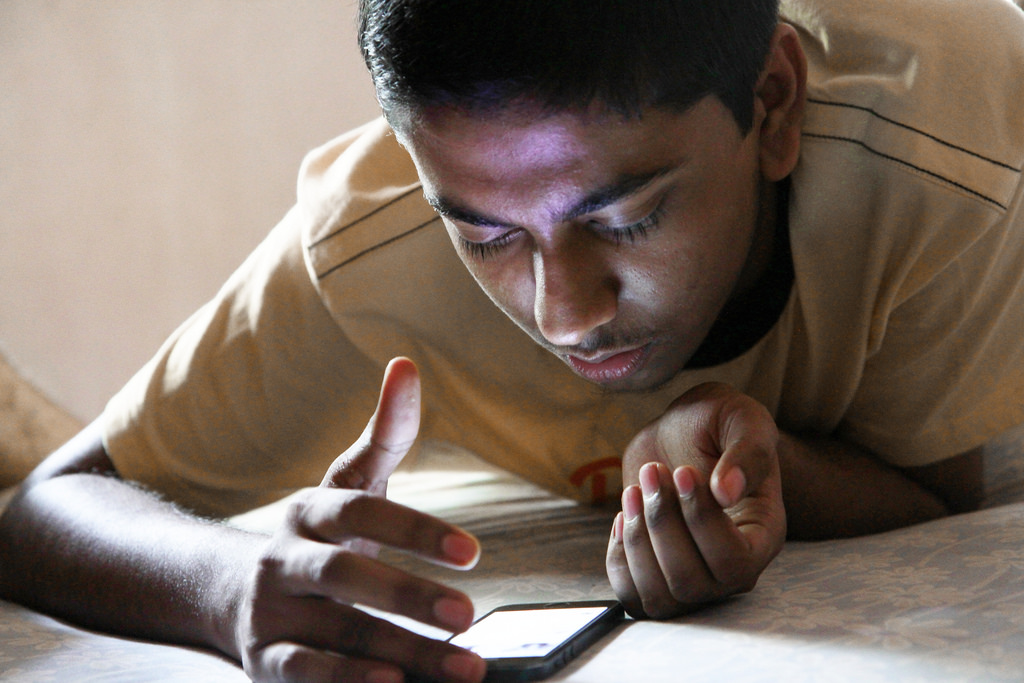Views expressed in opinion columns are the author’s own.
In the fourth grade, I was madly in love with the boy who sat across from me. He sported that cute skater boy haircut every prepubescent boy wished he could pull off and wore tiny wire-framed glasses that followed him through high school. To 9-year-old Maris, he was perfection. To express my naïve devotion, I would leave behind strings of anonymous notes proclaiming my love and even tucked a dramatic unsigned Valentine’s Day card into his desk.
This anonymity — fueled by my very innocent yet very real infatuation with him — can be seen nowadays in our modern love interactions. Of course, gone are the days of secret love professions written on construction paper. But it doesn’t mean we don’t see this same, fake manifestation of attraction in our digital relationships. This lack of a tangible, real connection is a hindrance of modern technology, and we must remain continuously wary of the distance it creates in our relationships with loved ones.
The use of mobile dating applications and websites in young people have nearly tripled since 2013, according to a 2016 article composed by the Pew Research Center. Apps like Tinder — where we ultimately decide whether we give someone the time of day by judging a grainy profile picture—are gaining incredible traction, especially with college students. But their increased popularity with our age demographic doesn’t necessarily correlate to a spike in valuable relationships.
Social media apps including ones for finding a potential partner lie on the foundation of promoting the user’s best self. This makes sense though, right? You wouldn’t want anyone seeing your embarrassing high school portraits or discovering that you still play Pokémon Go. In fact, “a fifth of young people admit that their online profile bears little resemblance to reality,” according to an article by The Telegraph.
When this self-created facade appears to succeed, we automatically receive a rush of instant gratification that fuels our pressing need to portray ourselves in an ideal light. Psychologist Richard Sherry states “we deeply lose ourselves or negate what authentically and compassionately feels to be ‘us'” due to social conformity. The same can be applied to dating apps — when we feel the need to impress, we run the risk of conforming to something other than ourselves. And while swiping right can’t render you anonymous or invisible like my little Valentine did for me, the online user is still protected behind the glass of his or her screen.
Additionally, in the blissful scenario of us clinching a significant other — with or without dating apps — we sometimes turn to technology to sustain our newfound love. Physician Alex Lickerman warned the use of technology can unintentionally substitute real-life relationships. “The problem, however, comes when we find ourselves subtly substituting electronic relationships for physical ones or mistaking our electronic relationships for physical ones,” he writes in Psychology Today. “We may feel we’re connecting effectively with others via the internet, but too much electronic-relating paradoxically engenders a sense of social isolation.” Just as Lickerman explains that an “LOL” doesn’t replace real laughter, interactions through technology cannot replace real-life, meaningful interaction.
Pew Research Center further emphasized the power of social media to create distance between significant others. In a survey given to teenagers, about one-third expressed “social media does not make them feel more connected with their significant other. Twenty-seven percent said social media “makes them feel jealous or unsure about their relationship.” Even though it feels like we are making real connections, digitizing love pulls couples further apart.
Needless to say, my fourth-grade lover boy wasn’t as into me as I was into him. We’re good friends now, surprisingly, but the false connection I thought we had as 9-year-olds can teach us all a lesson. We cannot hide behind our cell phone screens like I did behind that anonymous Valentine Day’s note. If we do, we inevitably grow more distanced in the millions of pixels and text messages between us and our loved ones.
Maris Medina is a freshman journalism major. She can be reached at marismedina29@gmail.com.



